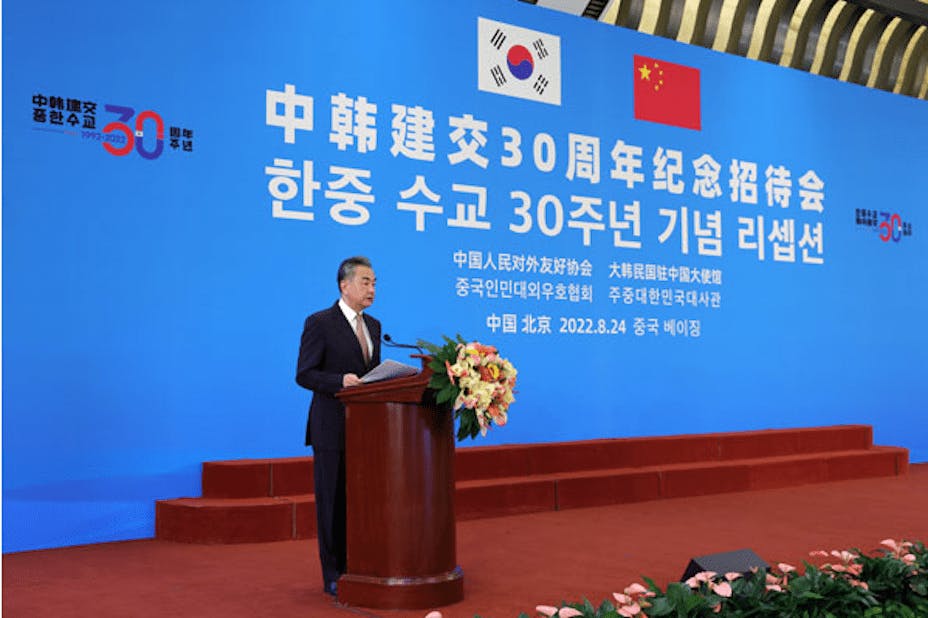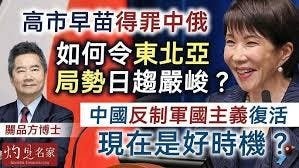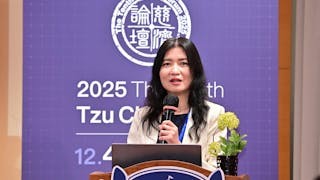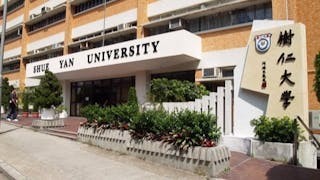2022年8月24日是中國與南韓建交30周年紀念,兩國均舉辦慶祝活動,雙方領導人及官員互相祝賀,交往頻仍。展望未來,兩國關係發展的挑戰與機遇並存。
首先,國家主席習近平與南韓總統尹錫悅在8月24日互致賀函。習近平指出,中韓關係之所以能取得輝煌發展成就,在於雙方堅持互尊互信,照顧彼此核心利益和重大關切,通過真誠溝通增進理解與信任。習近平亦表示,雙方堅持開放包容,攜手維護地區和平穩定,促進區域融合發展,維護國際關係基本準則,這些寶貴經驗值得雙方倍加珍惜和長期堅持。
習主席更強調,中韓要做好鄰居、好朋友、好夥伴,希望兩國加強戰略溝通,聚焦合作,共創兩國關係更加美好的未來。
韓方憂中美角力影響中韓關係
8月9日,中國外長王毅與南韓外長朴振在青島舉行會談。朴振表示,南韓一貫堅持實現朝鮮半島無核化,又指朝鮮半島的和平穩定面臨「空前威脅」,希望中方能為北韓選擇對話發揮「建設性作用」。此外,朴振並呼籲,中韓雙方進一步加深最高級別的戰略溝通,並希望習近平主席能在方便時訪問南韓。朴振更提出供應鏈及物流需要維持穩定的重要性,反映韓方憂慮中國的科技政策和中美角力帶來的影響。
王毅回應朴振的關注時表示,中韓關係經歷「風雨洗禮」,理應更加成熟、自主及穩定。歷史及實踐證明,中韓始終是安全與共的鄰居及相互需要的夥伴。王毅強調,兩國應當堅持獨立自主,不受外界干擾;應當堅持睦鄰友好,照顧彼此重大關切;應當堅持開放共贏,維護產供鏈穩定暢通;應當堅持平等尊重,互不干涉內政;應當堅持多邊主義,遵守聯合國憲章宗旨原則。
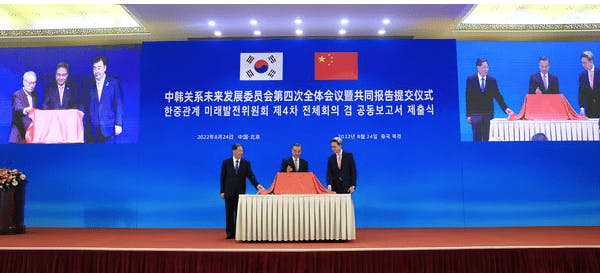
然而,中韓關係的一個重大挑戰,是中國反對南韓境內部署末端高空防禦導彈系統(Terminal High Altitude Area Defense,THAAD,又稱薩德系統)。南韓在美國協助下部署薩德系統,以應對北韓的「軍事威脅」,但中國對薩德系統威脅其國家安全深感憂慮,導致中韓關係自2017年以來受到損害。
事實上,只要威懾理論被運用於處理朝鮮半島的國家安全問題,中國、美國及南北韓的關係就難免錯綜複雜。北韓熱衷於發展和維持強大的軍事力量,包括測試和發展核武器。南韓和美國將北韓視為嚴重的軍事「威脅」,而中國作為北韓的友好鄰邦,可以在平壤政府與韓美之間充當中間人的角色。
南韓對處理中韓關係顯得小心謹慎。8月5日,美國眾議院議長佩洛西在充滿政治爭議的台灣之旅後到訪南韓,但南韓總統尹錫悅以「休假」為理由,沒有接見佩洛西。儘管他與佩洛西進行了 40 分鐘的電話會談,他擺出的姿態似乎是為了避免在政治敏感時期與中國對抗。對於美國處理台灣問題的方式,南韓的反應是相當敏銳的。
南韓年輕人對華態度負面
在新冷戰時代,美國在經濟和軍事領域與中國競爭,東亞成為中美角力的前線。南韓最近加入美國主導的印太經濟框架和「晶片四方聯盟」(Chip 4 alliance),引發了中國的敏感反應。 近期全球半導體晶片短缺,美國總統拜登和他的智囊建議由美國、南韓、日本和台灣組成晶片聯盟,但中國把這個「晶片四方聯盟」視為親美聯盟,威脅中國的安全利益。
在意識形態上,南韓跟美國一樣珍視民主、自由和人權等普世價值。南韓駐香港總領事白龍天早前表示,香港必須繼續維持其有別於中國大陸的開放及經貿轉運中心地位,以保持國際吸引力。白龍天說,香港自由開放的營商環境對國際商業至關重要,但他巧妙地避免提及香港的民主和人權。他更指出,若香港變得與中國一樣,便會失去存在的價值。
香港在經歷多年的政治動盪和對抗之後,近年在某程度上已被大陸化。白龍天的言論反映他關注香港的大陸化會發展到什麼程度。
事實上,南韓的公眾意見顯示,更多的年輕人對中國抱有負面態度。一項民調顯示,80%的南韓人對中國產生了負面情緒。也許這個調研結果並不令人意外,因為南韓擁有截然不同的政治文化,而且國際間對中國崛起的普遍看法,都關注於中國在外交、政治、經濟和軍事領域表現的自主性。
或許較幸運的是,南韓的外交政策由政治精英、資深外交官及熟悉中國文化的漢學家制定和推動。他們深諳必須有技巧、機智和果斷地與中國打交道。
在8月初,據報道中國官員意圖向南韓施加壓力,要求南韓維持前總統文在寅政府的「三不政策」承諾,即韓方不再部署新的薩德反導彈系統(THAAD),不加入美國導彈防禦系統(MD),不謀求韓美日軍事同盟。然而,據南韓媒體報道,南韓官員表示「三不」只是韓方闡明的立場,並非文在寅政府對中方的承諾。
南韓對華須採靈活外交政策
在北京舉行的中韓建交30周年慶祝活動,中國外長王毅與南韓駐華大使鄭在浩一同出席,彼此宣讀了兩國元首的賀函並致辭。值得注意的是,王毅在發言時表示中韓要互融互通、共謀發展,加強發展戰略對接,在高科技製造、大數據、綠色經濟等領域加強合作。王毅更指出,兩國應共同反對「脫鈎斷鏈」,共同捍衛自由貿易體系,共同維護產供鏈完整安全、穩定暢通、開放包容。
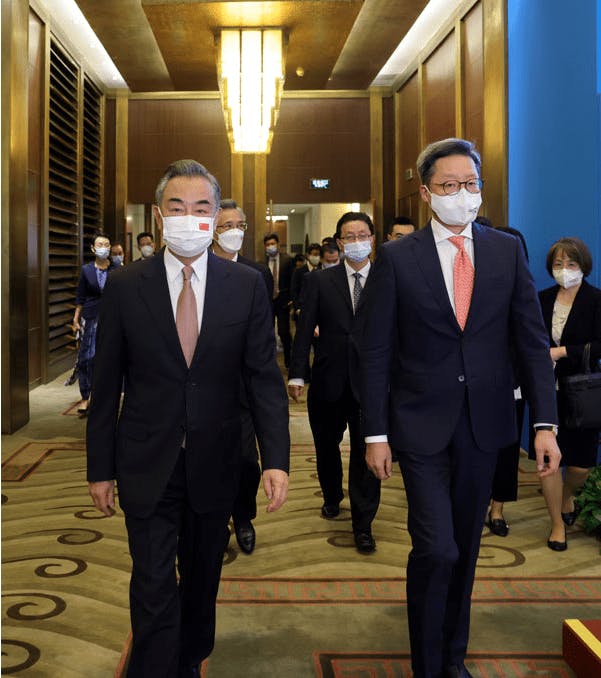
王毅的言論,顯然是試圖平息外界對中國經濟政策可能走向自我保護的擔憂。事實上,近期有關報道指出,中國在經濟政策上會延續實用主義。
要維持區域安全,或許以創新的做法構建一個東亞自由貿易經濟區,可以帶來長遠的和平與穩定。這個東亞自貿區可考慮以「區域全面經濟夥伴協定」(RCEP)為基礎建立,因為RCEP的成員包括了中國、日本及南韓。
趁着中韓慶祝建交30周年的機會,南韓統一部長官權寧世日前在首爾會見中國駐南韓大使邢海明,雙方就韓朝關係、朝鮮半島局勢交換意見。權寧世強調,韓方將與中國政府緊密溝通合作,落實尹錫悅政府旨在實現朝鮮半島無核化,以及改善南北韓關係的政策。權寧世還說,希望中國發揮「建設性作用」,促使北韓積極響應尹鍚悅總統的「大膽構想」,希望藉支援平壤改善經濟來換取半島無核化。
總括而言,在中韓建交30周年之際,雙方都展現一個共同願望,就是加強在各領域合作,深化相互交流。然而,薩德系統仍然是困擾中韓關係的障礙。如果雙方能夠處理好經濟關係,聚焦於非敏感領域上的合作,中韓關係仍然樂觀。畢竟,中國仍然是調解南北韓緊張關係的重要中間人。南韓面臨的挑戰,是在處理中美韓關係上,必須小心謹慎地達致平衡。南韓與美國有軍事同盟關係,在處理南韓、北韓、美國及中國四方的複雜關係上,必須對中國採取靈巧的外交策略。
Challenges and opportunities in China’s relations with South Korea
The 30th anniversary of the establishment of diplomatic relations between China and South Korea on August 24, 2022 was marked by celebrations, active engagement from both sides, challenges and opportunities for the two countries in the coming years.
First, the Chinese President Xi Jinping exchanged congratulatory messages with his South Korean counterpart Yoon Suk-yeol on August 24. President Xi remarked that Sino-South Korean have been developing quickly due to the mutual respect and trust from both sides, the accommodation of each other’s core interests, and the enhancement of understanding through communications. Moreover, both countries, according to Xi, adopt the principles of openness and inclusiveness, safeguarding regional peace and stability, promoting regional economic development, and preserving the basic norms in dealing with international relations. All these are valuable assets that both sides, President Xi said, should cherish.
President Xi also expressed his desire that both sides can maintain good friendly and neighborly relations, consolidate strategic communications and focus on cooperation.
On August 9, Chinese Foreign Minister Wang Yi met the South Korean Foreign Minister Park Jin in Qingdao. Park Jin said that the South Korean side insists on denuclearization in the Korean Peninsula, pointing to the “unprecedented threat” to regional peace, and hoping that the Chinese side can play a “constructive role” of fostering dialogue with North Korea. Park Jin appealed to China to attach importance to maintain strategic communication, expressing his hope that President Xi would be able to visit South Korea. Park Jin also appealed to the need for stability in logistical supplies – an indication that the South Korean side was worried about China’s technology policy and the impact of its rivalry with the US.
In response to Park Jin’s concerns, Wang Yi said that the Sino-South Korean relations had undergone “winds and rainfall,” that both sides remain safe neighbors coexisting with each other as necessary partners, and that both sides should insist on “independence and autonomy,” “non-interference” from outside, continuous openness, mutual respect and equality, multilateralism and the adherence to the UN Charter.
One big challenge in Sino-South Korean relations is the Chinese concern about the deployment of the Terminal High Altitude Area Defense (THADD) anti-missile system in South Korea – a defensive measure which have damaged their relationships since 2017. China is deeply concerned about its national security threat in the face of the THADD system, but South Korea has been aided by the US to deter the North Korean “military threat.”
As long as the principle of deterrence is used in dealing with national security in the Korean Peninsula, the relations between China, South Korea, US and North Korea are complex. North Korea is keen to develop and maintain its strong military, including the testing and development of its nuclear weapons. South Korea and the US see North Korea as a serious military “threat.” China as a friendly neighbor of North Korea can play the role of being a middleman between Pyongyang on the one hand and South Korea and the US on the other hand.
On August 5, the South Korean President Yoon Suk-yeol did not meet the Speaker of the US House of Representatives Nancy Pelosi due to his “scheduled vacation,” shortly after her politically provocative visit to Taiwan. President Yoon’s gesture appeared to avoid antagonizing China at a politically sensitive time although he had a 40-minute phone discussion with Pelosi. South Korea was sensitive to the way in which the US tackles the issue of Taiwan.
However, in the era of a new Cold War in East Asia where the US is competing with China in economic and military spheres, a recent move made by South Korea to join the US-led Indo-Pacific Economic Framework and Chip 4 triggers China’s sensitivity. The recent global shortages of semiconductor have made the US President Joe Biden and his think tank propose forming a Chips Alliance composed of South Korea, Japan and Taiwan. China, however, sees this Chip 4 Alliance as a pro-American alliance that threatens its security interests.
Ideologically, South Korea cherishes universal values such as democracy, freedom and human rights like the US. The South Korean Consul General in Hong Kong, Baek Yong-chun, has recently remarked that Hong Kong must continue its position as an open and an intermediary trading hub different from mainland China to maintain its international appeal. A free and open business environment in Hong Kong is essential for international business, according to Baek, who skillfully avoided mentioning democracy and human rights in Hong Kong, which has to some extent been mainlandized in the recent years after years of political turmoil and struggles.
Consul General Baek added that if Hong Kong were the same as China, then the territory would have no rationale to exist – a remark implying that he was quite concerned about the extent of mainlandization of Hong Kong.
In fact, public opinion in South Korea has shown that more young people have developed negative attitudes toward China. A poll demonstrated that 80 percent of the South Koreans have engendered negative sentiments on China. This finding is perhaps not surprising because of a very different political culture in South Korea and the widespread international perception that the rise of China has been marked by its assertiveness in the diplomatic, political, economic and military spheres.
Perhaps fortunately, the South Korean foreign policy is made and driven by political elites, career diplomats and Sinologists who understand how to deal with China skillfully, tactfully and assertively if necessary.
In early August, it was reported that Chinese officials attempted to exert pressure on the South Korean side to observe “three promises” made by the previous Moon Jae-in government, namely the “promises” of “not participating in the THAAD system, not adding any new THAAD anti-missile system, and not promoting the military alliance between South Korea, US and Japan.” However, the South Korean media reported that the South Korean officials in Beijing argued that these were “not promises” made by the Moon government.
During the celebration of the 30th anniversary of Sino-South Korean relations, the Chinese Foreign Minister Wang Yi attended a celebration event in Beijing with Chung Jae-ho, the South Korean ambassador to China. They both read the congratulatory messages from their presidents. Wang interestingly called on both sides to synergize developmental strategies by deepening cooperation in areas such as high-tech manufacturing, big data and green economy. He added that both sides should oppose decoupling or severing supply chains, safeguard the free trade system, and jointly maintain the openness and inclusiveness of industrial supply chains.
Wang’s remarks clearly attempted to calm the concerns about whether China’s economic policies might turn more self-protective. Recent reports on China have pointed to the continuation of economic pragmatism.
Perhaps more innovative efforts at developing an East Asian Free Trade Economic Region, which can be considered and made on the basis of the Regional Comprehensive Economic Partnership Agreement, and which is composed of China, Japan and South Korea, would bring about peace and stability in the long run.
Grasping the chance of celebrating the 30th anniversary of bilateral relations between China and South Korea, the Korean Unification Minister Kwon Young-se met China’s top ambassador in Seoul, Xing Haiming. Kwon stressed that his ministry would closely communicate with the Chinese side to push ahead with the policies of the Yoon Suk-yeol administration on the denuclearization of the Korean peninsula and the consolidation of cooperation. Kwon also called on China to play a “constructive role” to elicit any positive response from North Korea on President Yoon’s “audacious plan” of seeking to help Pyongyang to improve its economy in return for denuclearization.
In conclusion, the 30th anniversary of Sino-South Korean relations are marked by a common desire to enhance cooperation and deepen mutual exchanges in all areas. However, the issue of THAAD remains a baffling problem in Sino-South Korean relations. If both sides can tackle economic relations and focus on non-sensitive areas of cooperation, Sino-South Korean relations remain optimistic. After all, China remains a crucial middleman that can bridge the communication gap and frosty relations between South Korea and North Korea. The challenge is for South Korea to strike a very precarious balance between its tendency to be dragged into the military alliance with the US and its necessity of adopting a skillful diplomacy toward China in the very complex relations between Seoul, Pyongyang, Washington and Beijing.
原刊於澳門新聞通訊社(MNA)網站,本社獲作者授權轉載。



